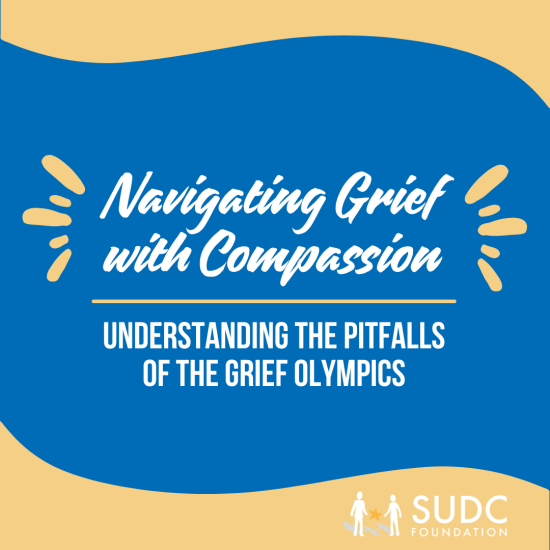01 Apr Navigating Grief with Compassion: Understanding the Pitfalls of the Grief Olympics

Grieving is an intimate and deeply personal process, one that no two individuals experience in quite the same way. Yet, amidst our sorrow, it’s not uncommon to find ourselves inadvertently caught up in what some call the “Grief Olympics” – a subtle comparison of our pain and loss. While this may not be intentional, it’s essential to recognize how this tendency can unintentionally hinder our healing journey.
The term “Grief Olympics” refers to the subtle yet impactful tendency to compare our grief to that of others. It often manifests in statements such as, “I know you’re hurting, but my pain is greater because…” or “You’ve had it easier compared to my experience.” Though it may stem from a place of seeking validation or understanding, engaging in the Grief Olympics can unintentionally invalidate our own or others’ feelings of grief.
Why might the “Grief Olympics” Stifle Healing?
Invalidation of Personal Experiences: Each person’s grief journey is uniquely their own, shaped by countless factors such as the relationship with the departed and the circumstances surrounding their loss.
Imagine someone shares the profound grief of losing a cherished pet and companion in a support group. Another member, seeking to empathize, shares their own experience of losing a family member, suggesting it’s more significant because of the familial bond. This unintentionally overlooks the depth of the first person’s loss and may foster a sense of inadequacy instead of empathy. Engaging in the Grief Olympics can inadvertently lead to feelings of inadequacy or shame if our grief doesn’t measure up to perceived standards.
Diminished Empathy: Comparing grief often shifts the focus away from empathizing with each other’s pain to a more competitive mindset.
Consider a workplace discussion, a colleague shares their pet loss, another responds, comparing their own grief. In a parent-teacher meeting, a parent discusses their child’s pet loss; the teacher shares their family loss experience, or in an online forum, a member expresses grief over a friend’s death; another member compares it to their sibling loss. These interactions illustrate common situations where grief comparisons occur, hindering support. This can hinder the sense of connection and support that is essential for healing, as it fosters an environment where individuals feel the need to compete for validation rather than seek solace in shared experiences.
Unhealthy Competition: Grief is not a competition to be won or lost; it’s a profound and deeply personal journey of healing and acceptance. Consider someone expressing their deep sorrow over the loss of a cherished pet. Instead of offering solace, a friend responds, “You think losing a pet is hard? Try losing a family member.” This comparison diminishes the person’s grief, fostering competition rather than empathy.
In another scenario, a widow shares her struggle with coping after losing her spouse. Rather than offering support, a colleague interjects, “You’re lucky you had so many years together. My partner’s sudden death was far more traumatic.” This comparison dismisses the widow’s pain, creating unnecessary competition in grief. Engaging in the Grief Olympics perpetuates a harmful cycle of comparison rather than fostering a supportive environment where individuals can honor their grief and find comfort in each other’s presence.
Suppressed Expression of Emotions: Feeling the pressure to measure up to others’ standards of grief may lead to suppressing our true feelings, which can prolong the healing process and hinder emotional growth. For instance, at a memorial service, someone may hide their grief to appear composed and strong. This suppression prevents them from fully processing their loss and delays emotional growth.
In a workplace, an employee might return shortly after a loss to avoid appearing vulnerable or burdening colleagues. By suppressing emotions, they struggle to focus and delay healing. Similarly, in social settings, individuals may feel compelled to act cheerfully despite ongoing grief, hindering their ability to seek support. It’s essential to create a safe space where all emotions are acknowledged and accepted without judgment.
Instead of participating in the Grief Olympics, it’s helpful to be intentionally in our approach to grief with compassion, understanding, and an open heart. Here’s how we can support each other – and ourselves – on this journey:
Practice Active Listening: Offer a compassionate ear without judgment, allowing each person to express their feelings freely and without fear of comparison or invalidation.
Imagine a friend confides in you about their struggles with anxiety. Instead of immediately offering advice or sharing your own experiences, you practice active listening by fully focusing on what they’re saying. You provide a compassionate ear, allowing them to express their feelings without interruption or judgment. By demonstrating empathy and understanding, you create a safe space for them to freely express themselves, knowing they won’t be compared to others or invalidated.



